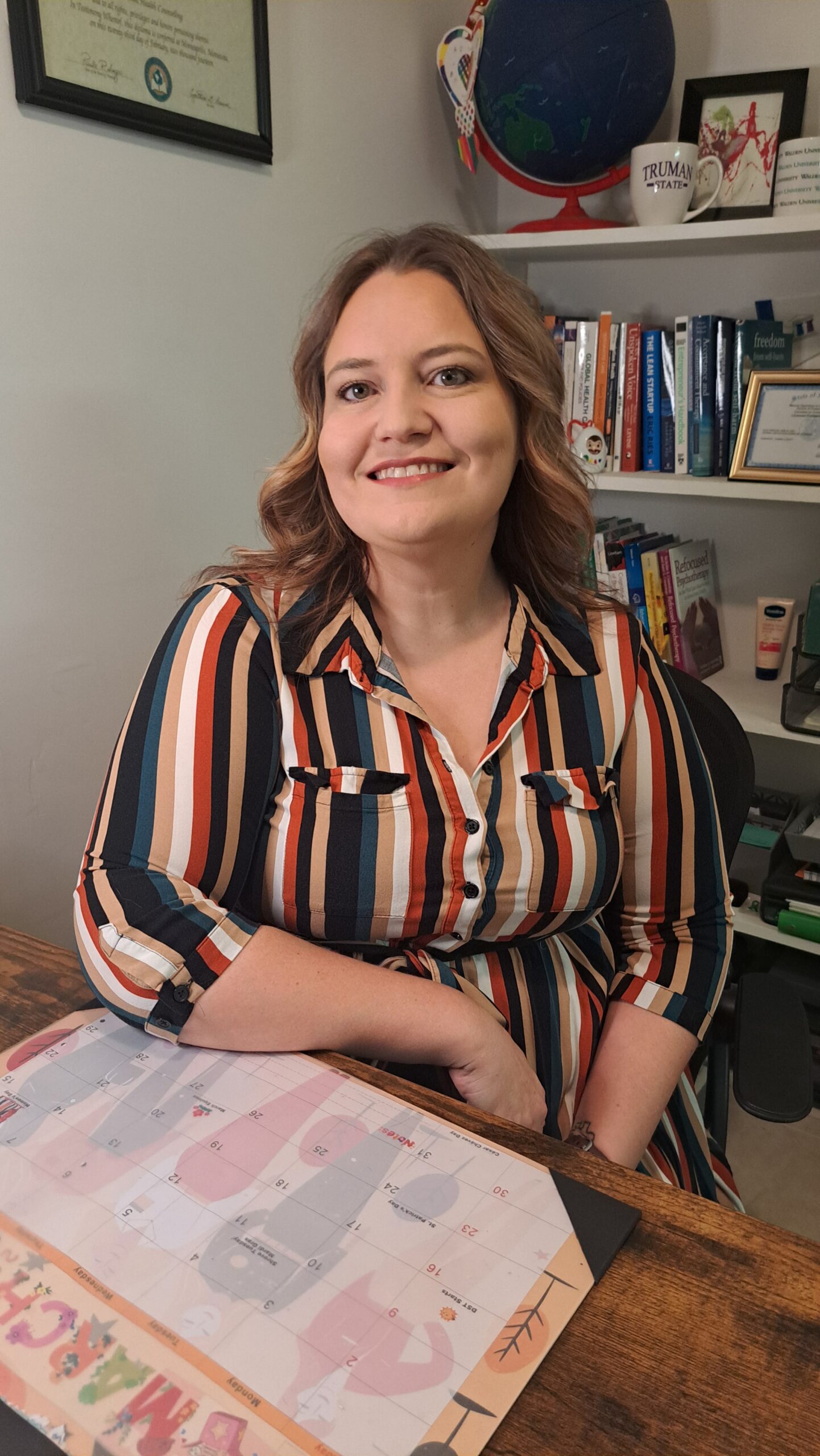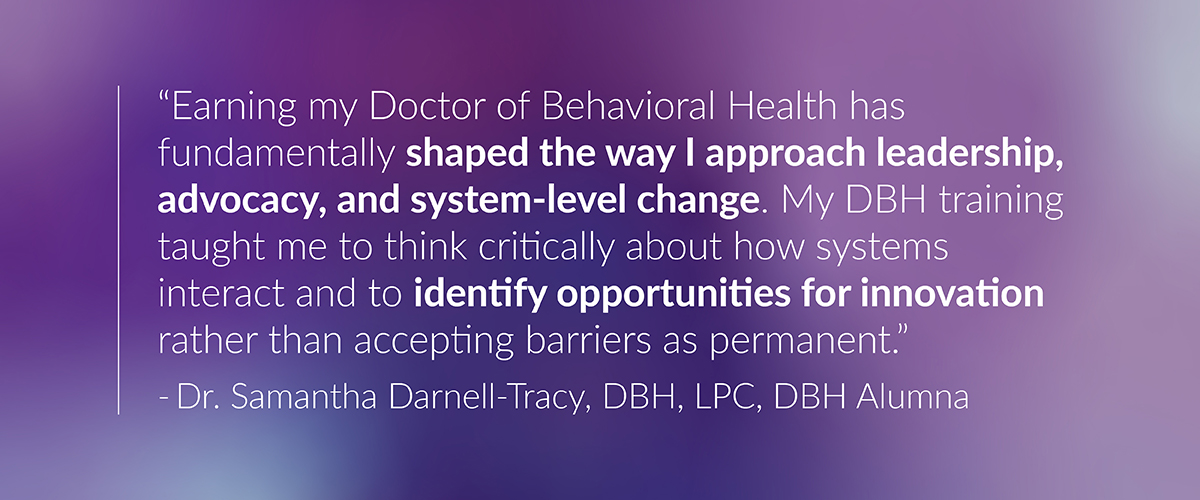CGI Alumna Championing Behavioral Health Reform With Compassionate Leadership
 When passion aligns with purpose, leadership becomes transformative, and few exemplify this more than Dr. Samantha Darnell-Tracy, DBH, LPC, an alumna of the Cummings Graduate Institute for Behavioral Health Studies (CGI). In Spring 2025, Dr. Darnell-Tracy was selected to serve as President-Elect of the Missouri Mental Health Counselors Association (MMHCA) and began her term on July 1, 2025. She will serve as President-Elect for one year, followed by one year as President, standing at the intersection of behavioral health, advocacy, and education, leading with both courage and compassion.
When passion aligns with purpose, leadership becomes transformative, and few exemplify this more than Dr. Samantha Darnell-Tracy, DBH, LPC, an alumna of the Cummings Graduate Institute for Behavioral Health Studies (CGI). In Spring 2025, Dr. Darnell-Tracy was selected to serve as President-Elect of the Missouri Mental Health Counselors Association (MMHCA) and began her term on July 1, 2025. She will serve as President-Elect for one year, followed by one year as President, standing at the intersection of behavioral health, advocacy, and education, leading with both courage and compassion.
Reflecting on one of her proudest professional moments, she recalls the experience of organizing and hosting her first MMHCA conference.
“Hosting my first conference as President-Elect of the Missouri Mental Health Counselors’ Association was both a personal milestone and a professional honor,” said Dr. Darnell-Tracy. “Personally, it was incredibly rewarding to see months of planning come to life and to witness so many passionate professionals gathered with a shared purpose.”
The event became more than just a gathering, it was a living testament to the spirit of connection that drives the behavioral health community forward.
“The experience reaffirmed my commitment to this field and reminded me of the power of connection. The conversations, collaborations, and encouragement exchanged throughout the event were inspiring.”
Beyond the personal fulfillment, the conference provided an opportunity for professional growth and community building.
“Professionally, it was an invaluable opportunity to strengthen my leadership skills and to grow my network with colleagues, educators, and advocates across Missouri,” she shared. “Hosting the conference not only allowed me to contribute to the mission of MMHCA but also to learn from others’ perspectives and experiences.”
Shaping the Future of Mental Health Policy
In her leadership role, Dr. Darnell-Tracy brings the same sense of purpose and collaboration to policy work.
“As President-Elect of MMHCA, I see my role as a bridge between our members’ professional experiences and the legislative changes that directly impact their ability to serve clients effectively,” she said. “One of my top priorities is to help strengthen MMHCA’s voice in policy discussions, ensuring that mental health counselors are represented in every decision that affects access to care, reimbursement, and professional recognition.”
Her work is guided by a belief that progress in mental health care depends on unity and advocacy.
“I believe that lasting progress for our field depends on collaboration and advocacy. My goal is to work closely with state legislators, partner organizations, and our members to promote policies that expand access to quality mental health services, protect the rights of both providers and clients, and advance professional parity for counselors in Missouri.”
How CGI’s DBH Program Ignited a Systems-Level Vision
Dr. Darnell-Tracy credits her time in CGI’s Doctor of Behavioral Health program for expanding her perspective beyond clinical practice to systems-level leadership.
“The DBH program reinforced the importance of advocacy and data-informed decision-making,” she said. “These skills have helped me lead with both compassion and clarity, bridging the gap between providers, policymakers, and the communities we serve.”
Her doctoral training gave her the tools to blend strategy with empathy, preparing her to lead meaningful, evidence-based change.
“Earning my Doctor of Behavioral Health has fundamentally shaped the way I approach leadership, advocacy, and system-level change,” she explained. “My DBH training taught me to think critically about how systems interact and to identify opportunities for innovation rather than accepting barriers as permanent.”
During the recent MMHCA conference, she had the opportunity to share her own research journey with peers and colleagues.
“The most memorable and impactful moment for me during the recent conference was presenting a session on my Culminating Project topic,” said Dr. Darnell-Tracy. “Sharing that work felt like bringing my academic journey full circle.”
Inspiring the Next Generation of Disruptors
When asked what advice she would share with current and future DBH students, Dr. Darnell-Tracy offered guidance rooted in both humility and hope.
“Growth happens when you step outside your comfort zone: take on opportunities that stretch your skills, speak up in spaces where your voice can make a difference, and trust the knowledge and perspective you’re gaining,” she advised. “At the same time, remember that sustainable leadership begins with self-care. You can’t pour from an empty cup.”
Her journey is a reflection of what it means to lead with integrity to balance advocacy with empathy, and innovation with humanity. Through her work, Dr. Darnell-Tracy continues to elevate the role of behavioral health professionals, demonstrating how DBHs are shaping the future of integrated care in every corner of the profession.































